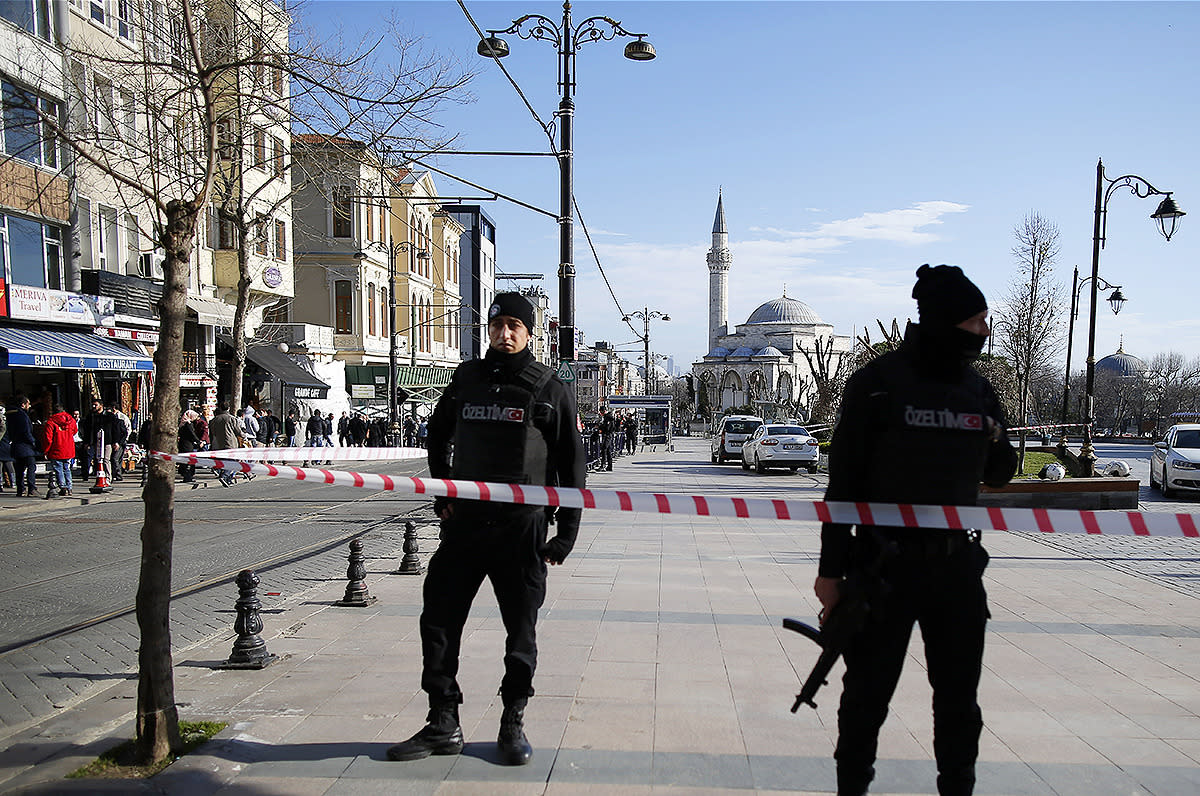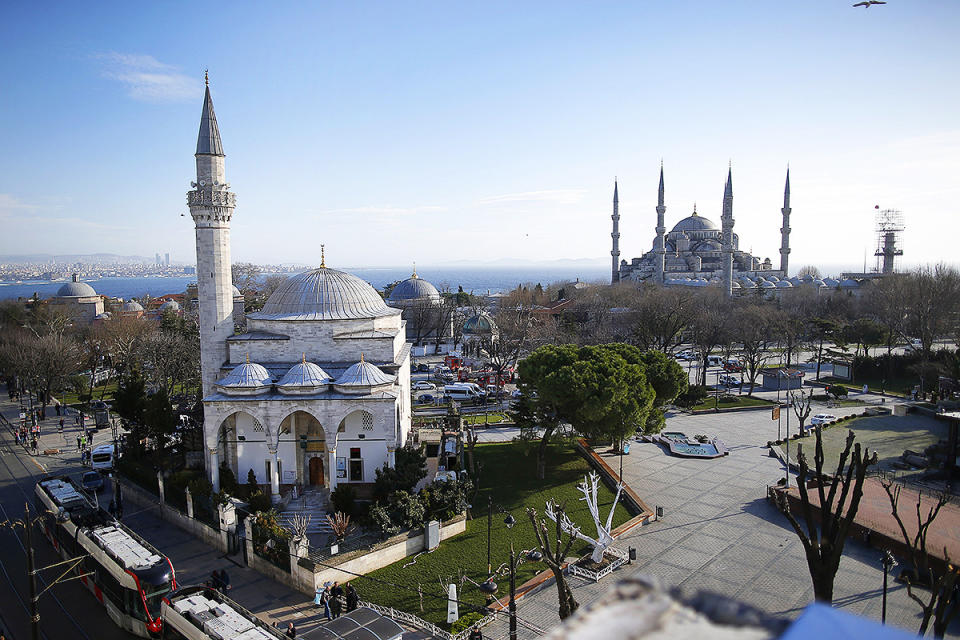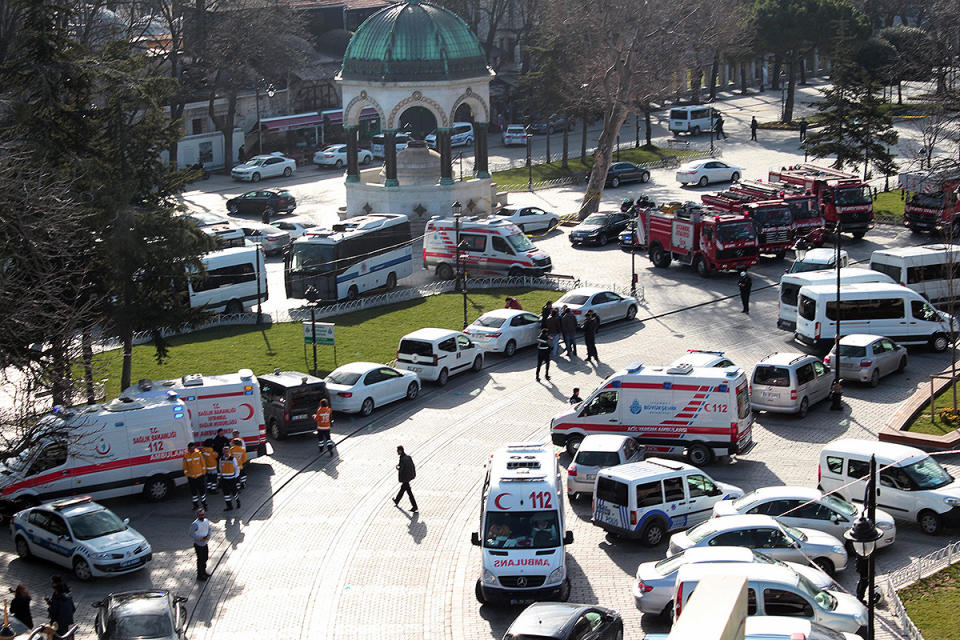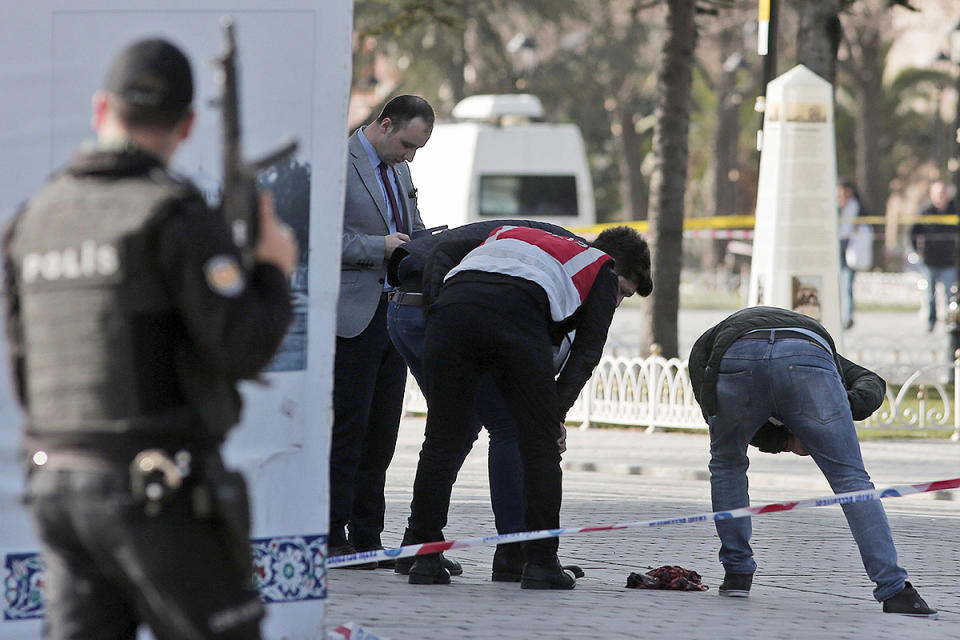10 Dead, 15 Wounded in Istanbul Tourist District Explosion

Policemen secure the historic Sultanahmet district after an explosion in Istanbul, Tuesday, Jan. 12, 2016. (Photo: AP Photo/Emrah Gurel)
A suicide bomber affiliated with the Islamic State group detonated a bomb in a historic district of Istanbul popular with tourists Tuesday morning, killing at least 10 people - nine of them German tourists - and wounding 15 others, Turkish officials said.
The bomber who carried out the attack in Istanbul’s Sultanahmet district was a 28-year-old Syrian national, Deputy Prime Minister Numan Kurtulmus said.
Turkish Prime Minister Ahmet Davutoglu said the perpetrator was a member of IS and pledged to battle the militant group until it no longer “remains a threat” to Turkey or the world.
Related: How to Travel Abroad Safely in the Age of Terrorism
Turkey’s state-run news agency said Davutoglu held a telephone conversation with German chancellor Angela Merkel to express his condolences. A senior government official confirmed that most of the victims were German. Merkel had earlier said they were part of a German travel group.
“I strongly condemn the terror incident that occurred in Is! tanbul, at the Sultanahmet Square, and which has been assessed as being an attack by a Syria-rooted suicide bomber,” President Recep Tayyip Erdogan said.
It was unclear whether the death toll of 10 included the alleged bomber.
Related: Is Israel Safe for Tourists Right Now?
Merkel, speaking at a news conference in Berlin, decried the attack.
“Today Istanbul was hit; Paris has been hit, Tunisia has been hit, Ankara has been hit before,” she said. “International terrorism is once again showing its cruel and inhuman face today.”

A view of the Sultan Ahmed Mosque, right, better known as the Blue Mosque in the historic Sultanahmet district of Istanbul, the area of an explosion, Tuesday, Jan. 12, 2016. (Photo: AP Photo/Emrah Gurel)
The explosion, which could be heard from several neighborhoods, was at a park that is home to a landmark obelisk, some 25 meters (yards) from the historic Blue Mosque.
Turkey’s Dogan news agency reported that one Norwegian and one Peruvian were also among the wounded, and Seoul’s Foreign Ministry told reporters via text message that a South Korean had a finger injury. The Norwegian Foreign Ministry told news agency NTB that the Norwegian tourist was slightly hurt and was being treated in a local hospital.
Kurtulmus, the deputy premier, said two of the wounded were in serious condition.
Germany and Denmark have warned their citizens to avoid crowds outside tourist attractions in Istanbul.
Last year, Turkey agreed to take a more active role in the U.S.-led battle against the IS group. Turkey opened its bases to U.S. aircraft to launch air raids on the extremist group in Syria and has carried out a limited number of strikes on the group itself.
It has also moved to tighten security along its 900-kilometer (560-mile) border with Syria in a bid to stem the flow of militants.

Ambulances and firefighters stationed near the city’s landmark Sultan Ahmed Mosque or Blue Mosque after an explosion at Istanbul’s historic Sultanahmet district, which is popular with tourists, Tuesday, Jan. 12, 2016. (Photo: IHA via AP)
The attack comes at a time of heightened violence between Turkey’s security forces and militants linked to the outlawed Kurdistan Workers’ Party, or PKK, in the country’s mostly-Kurdish southeast.
The country is also dealing with more than 2 million Syrian refugees and a wave of migrants from Syria and other countries pouring across Turkey to Europe.
Police sealed the area, barring people from approaching in case of a second explosion, and a police helicopter hovered overhead.
The Sultanahmet neighborhood is Istanbul’s main sightseeing area and includes the Topkapi Palace and the former Byzantine church of Haghia Sophia, now a museum.
Erdem Koroglu, who was working at a nearby office, told NTV television he saw several people on the ground following the blast.
“It was difficult to say who was alive or dead,” Koroglu said. “Buildings rattled from the force of the explosion.”
Davutoglu immediately convened a security meeting with the country’s interior minister and other officials.

Police search the area at the historic Sultanahmet district after an explosion in Istanbul, Tuesday, Jan. 12, 2016. (Photo: AP Photo/Lefteris Pitarakis)
As with previous attacks, authorities imposed a news blackout, barring media from showing images of the dead or injured or reporting any details of the investigation.
Turkey suffered two major bombing attacks last year, both blamed on the Islamic State group.
More than 30 people were killed in a suicide attack in the town of Suruc, near Turkey’s border with Syria, in July.
Two suicide bombs exploded in October outside Ankara’s main train station as people gathered for a peace rally, killing more than 100 in Turkey’s deadliest-ever attack. The prosecutor’s office said that attack was carried out by a local IS cell.
Related: How Not to Be a Bad American Abroad
Last month, Turkish authorities arrested two suspected IS militants they said were planning suicide bombings during New Year’s celebrations in the capital Ankara.
__
Fraser reported from Ankara, Turkey. Mehmet Guzel in Istanbul, Kirsten Grieshaber and Geir Moulson in Berlin and Jan M. Olsen in Copenhagen, Denmark contributed.
WATCH: Take That, Terrorism! 7 Ways to Travel Without Fear
Let Yahoo Travel inspire you every day. Hang out with us on Facebook, Twitter, Instagram, and Pinterest. Check out our original adventure travel series A Broad Abroad.

